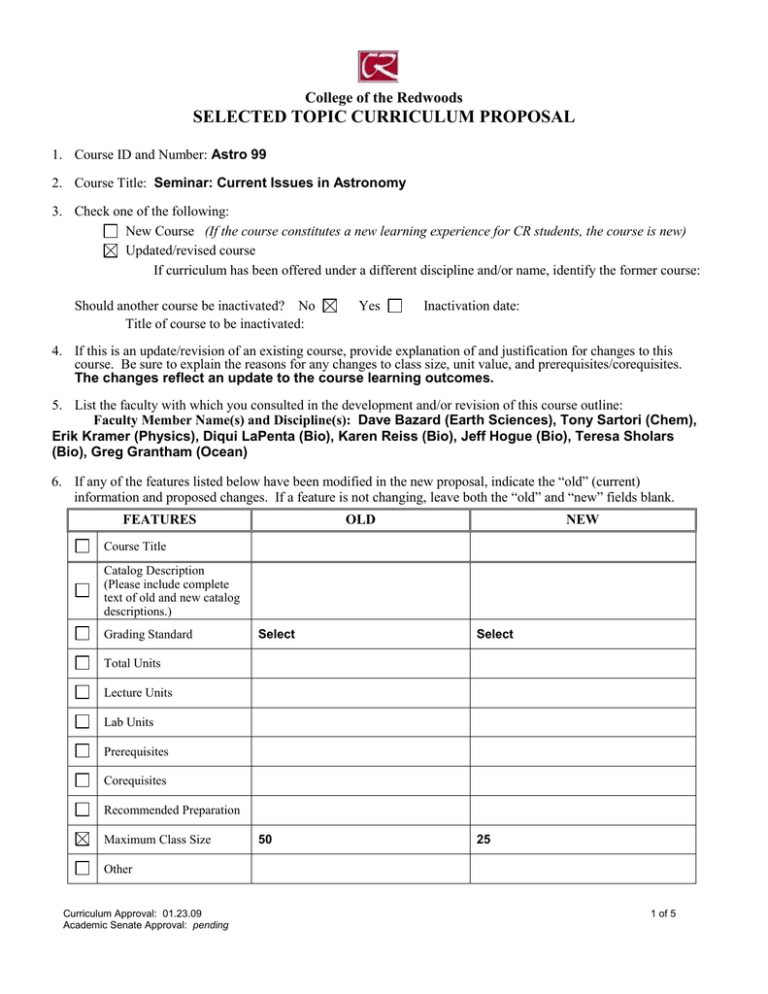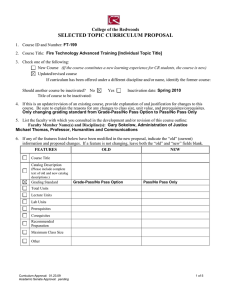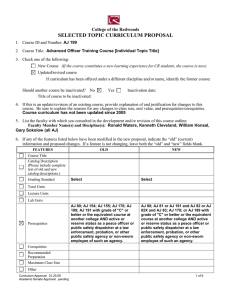SELECTED TOPIC CURRICULUM PROPOSAL College of the Redwoods
advertisement

College of the Redwoods SELECTED TOPIC CURRICULUM PROPOSAL 1. Course ID and Number: Astro 99 2. Course Title: Seminar: Current Issues in Astronomy 3. Check one of the following: New Course (If the course constitutes a new learning experience for CR students, the course is new) Updated/revised course If curriculum has been offered under a different discipline and/or name, identify the former course: Should another course be inactivated? No Title of course to be inactivated: Yes Inactivation date: 4. If this is an update/revision of an existing course, provide explanation of and justification for changes to this course. Be sure to explain the reasons for any changes to class size, unit value, and prerequisites/corequisites. The changes reflect an update to the course learning outcomes. 5. List the faculty with which you consulted in the development and/or revision of this course outline: Faculty Member Name(s) and Discipline(s): Dave Bazard (Earth Sciences), Tony Sartori (Chem), Erik Kramer (Physics), Diqui LaPenta (Bio), Karen Reiss (Bio), Jeff Hogue (Bio), Teresa Sholars (Bio), Greg Grantham (Ocean) 6. If any of the features listed below have been modified in the new proposal, indicate the “old” (current) information and proposed changes. If a feature is not changing, leave both the “old” and “new” fields blank. FEATURES OLD NEW Course Title Catalog Description (Please include complete text of old and new catalog descriptions.) Grading Standard Select Select 50 25 Total Units Lecture Units Lab Units Prerequisites Corequisites Recommended Preparation Maximum Class Size Other Curriculum Approval: 01.23.09 Academic Senate Approval: pending 1 of 5 College of the Redwoods SELECTED TOPIC COURSE OUTLINE 1. DATE: 2/14/12 2. DIVISION: Math, Science, and Engineering 3. COURSE ID AND NUMBER: Astro 99 4. COURSE TITLE (appears in catalog): Seminar: Current Issues in Astronomy 5. SHORT TITLE (appears on student transcripts; limited to 30 characters, including spaces): Current Issues:Astronomy 6. LOCAL ID (TOPS): 191100 (Taxonomy of Program codes http://www.cccco.edu/Portals/4/TopTax6_rev0909.pdf) 7. NATIONAL ID (CIP): 40.0201 (Classification of Instructional Program codes can be found in Appendix B of the TOPS code book http://www.cccco.edu/Portals/4/AA/CrosswalkTOP6to2010CIP.pdf) 8. Discipline(s): Select from CCC System Office Minimum Qualifications for Faculty http://www.cccco.edu/Portals/4/AA/Minimum%20Qualifications%20Handbook%20for%202010-2012.pdf Course may fit more than one discipline; identify all that apply: Physics/Astronomy 9. FIRST TERM NEW OR REVISED COURSE MAY BE OFFERED: Fall 2012 10. TOTAL UNITS: 0.5-3 [Lecture Units: 0.5-3 Lab Units: 0] TOTAL HOURS: 18 [Lecture Hours: 18 Lab Hours: 0] (1 unit lecture=18 hours; 1 unit lab=54 hours) 11. MAXIMUM CLASS SIZE: 25 12. WILL THIS COURSE HAVE AN INSTRUCTIONAL MATERIALS FEE? No Yes Fee: $ (If “yes,” attach a completed “Instructional Materials Fee Request Form”—form available in Public Folders>Curriculum>Forms) GRADING STANDARD Letter Grade Only Pass/No Pass Only Grade-Pass/No Pass Option Is this course to be offered as part of the Honors Program? No Yes If yes, explain how honors sections of the course are different from standard sections. DESCRIPTION OF SELECTED TOPIC-- The description should clearly describe the scope of the course, its level, and what kinds of student goals the course is designed to fulfill. The description should begin with a sentence fragment. A course examining current issues in Astronomy. Students will build on the basic skills and concepts they have learned in introductory astronomy by exploring issues at the forefront of modern astronomy. Topics may include astrobiology, black holes, is Pluto a planet, rovers on Mars, dark matter and energy, the space elevator, space tourism, and cosmology. Special notes or advisories (e.g. field trips required, prior admission to special program required, etc.): PREREQUISITE COURSE(S) No Yes Course(s): Astro 10 Rationale for Prerequisite: Describe representative skills without which the student would be highly unlikely to succeed . The student must have an understanding of the scientific method, electromagnetic radiation, the evolution of the solar system, and the life course of the sun. COREQUISITE COURSE(S) Curriculum Approval: 01.23.09 Academic Senate Approval: pending 2 of 5 No Yes Rationale for Corequisite: Course(s): RECOMMENDED PREPARATION No Yes Course(s): Rationale for Recommended Preparation: COURSE LEARNING OUTCOMES –This section answers the question “what will students be able to do as a result of taking this course?” State some of the objectives in terms of specific, measurable student actions (e.g. discuss, identify, describe, analyze, construct, compare, compose, display, report, select, etc.). For a more complete list of outcome verbs please see Public Folders>Curriculum>Help Folder>SLO Language Chart. Each outcome should be numbered. 1. 2. 3. Be conversant in special topics in modern astronomy. Provide sound reasoning in support of a particular argument. Critically analyze data and conclusions. REPRESENTATIVE LEARNING ACTIVITIES –This section provides examples of things students may do to engage the course content (e.g., listening to lectures, participating in discussions and/or group activities, attending a field trip). These activities should relate directly to the Course Learning Outcomes. Each activity should be numbered. 1. 2. 3. 4. Reading current articles in the field of Astronomy. Listening to short lectures on background material. Analyzing the research and identifying strengths and weaknesses. Participating in group discussions. ASSESSMENT TASKS –This section describes assessments instructors may use to allow students opportunities to provide evidence of achieving the Course Learning Outcomes. Each assessment should be numbered. Representative assessment tasks (These are examples of assessments instructors could use): 1. Active participation in class discussions. 2. Presenting an overview of a particular topic that the class will discuss. 3. Writing one or more out-of-class essays that critically analyze and/or describe an avenue of research or a particular data set and its long term goals for the field. Required assessments for all sections (These are assessments that are required of all instructors of all sections at all campuses/sites. Not all courses will have required assessments. Do not list here assessments that are listed as representative assessments above.): 1. COURSE CONTENT –This section describes what the course is “about”—i.e. what it covers and what knowledge students will acquire Describe course content and list texts for two representative selected topics, demonstrating clearly that each will provide significantly different content. Representative Topic #1 Course Title: What is a Planet? Concepts: What terms and ideas will students need to understand and be conversant with as they demonstrate course outcomes? Each concept should be numbered. 1. 2. 3. Application of the scientific method to a variety of questions in the field. Convergence of multiple lines of evidence leading to testable theories. Geologic Time. Issues: What primary tensions or problems inherent in the subject matter of the course will students engage? Each issue should be numbered. 1. 2. Responsible environmental stewardship. Who owns space and controls access to its resources? Themes: What motifs, if any, are threaded throughout the course? Each theme should be numbered. 1. The search for life in the Universe. Curriculum Approval: 01.23.09 Academic Senate Approval: pending 3 of 5 2. Analytical investigation of the planets, stars, and the evolution of the Universe. Skills: What abilities must students have in order to demonstrate course outcomes? (E.g. write clearly, use a scientific calculator, read college-level texts, create a field notebook, safely use power tools, etc.) Each skill should be numbered. 1. 2. Read and understand assignments. Solve basic mathematical problems involving conversions, averages, and simple algebraic relationships. EXAMPLES OF APPROPRIATE TEXTS OR OTHER READINGS –This section lists example texts, not required texts. Author, Title, and Date Fields are required Author Palen, Kay, Smith, and Blumenthal Author www.exoplanets.org Title Author www.space.com Title Author Title Title Understanding Our Universe Date 2012 How many planets exist outside our solar system? Is Pluto a Planet? Date Date 2012 2006 Date Other Appropriate Readings: Representative Topic #2 Course Title: Life in the Universe Concepts: What terms and ideas will students need to understand and be conversant with as they demonstrate course outcomes? Each concept should be numbered. 1. Scientific uncertainty in both quantitative measurement of variables and qualitative discussion of various hypotheses. 2. Understanding the nature of the Earth's place in the solar system and the Universe. 3. Big Bang Theory. Issues: What primary tensions or problems inherent in the subject matter of the course will students engage? Each issue should be numbered. 1. Role of the citizenry in evaluating and setting the goals and objectives of science. Themes: What motifs, if any, are threaded throughout the course? Each theme should be numbered. 1. The nature of light and the breakthroughs and limitations it presents in astronomy. 2. The role of humanity in monitoring, investigating, and changing the world we live in. Skills: What abilities must students have in order to demonstrate course outcomes? (E.g. write clearly, use a scientific calculator, read college-level texts, create a field notebook, safely use power tools, etc.) Each skill should be numbered. 1. 2. Analyze data and provide a logical interpretation. Organize scientific information in an essay or other assignment. EXAMPLES OF APPROPRIATE TEXTS OR OTHER READINGS –This section lists example texts, not required texts. Author, Title, and Date Fields are required Author Freeman Title Discovering the Essential Universe Author www.spacedaily.com Title Author Title Date Author Title Date Date 2012 Astrobiology: The search for life in the universe Date 2006 Other Appropriate Readings: From magazines at the level of Scientific American, geared towards the educated public. COURSE TYPES Curriculum Approval: 01.23.09 Academic Senate Approval: pending 4 of 5 1. Is the course part of a Chancellor’s Office approved CR Associate Degree? No Yes If yes, specify all program codes that apply. (Codes can be found in Outlook/Public Folders/All Public Folders/ Curriculum/Degree and Certificate Programs/choose appropriate catalog year): Required course for degree(s) Restricted elective for degree (s) Restricted electives are courses specifically listed (i.e. by name and number) as optional courses from which students may choose to complete a specific number of units required for an approved degree. 2. Is the course part of a Chancellor’s Office approved CR Certificate of Achievement? No Yes If yes, specify all program codes that apply. ( Codes can be found in Outlook/Public Folders/All Public Folders/ Curriculum/Degree and Certificate Programs/choose appropriate catalog year): Required course for certificate(s) Restricted elective for certificate(s) Restricted electives are courses specifically listed (i.e. by name and number) as optional courses from which students may choose to complete a specific number of units required for an approved certificate. 3. Is the course Stand Alone? 4. Basic Skills: NBS Not Basic Skills 5. Work Experience: NWE Not Coop Work Experience 6. Course eligible for Career Technical Education funding (applies to vocational and tech-prep courses only): yes 7. Purpose: A Liberal Arts Sciences 8. Accounting Method: W Weekly Census 9. Disability Status: N Not a Special Class Submitted by: No Yes (If “No” is checked for BOTH #1 & #2 above, the course is stand alone) Jon Pedicino Tel. Ext. Division Chair/Director: Rachel Anderson 4232 no Date: 2/14/12 Review Date: 2/16/12 CURRICULUM COMMITTEE USE ONLY Approved by Curriculum Committee: No Academic Senate Approval Date: 3.2.12 Curriculum Approval: 01.23.09 Academic Senate Approval: pending Yes Date: 2.24.12 Board of Trustees Approval Date: 4.3.12 5 of 5




